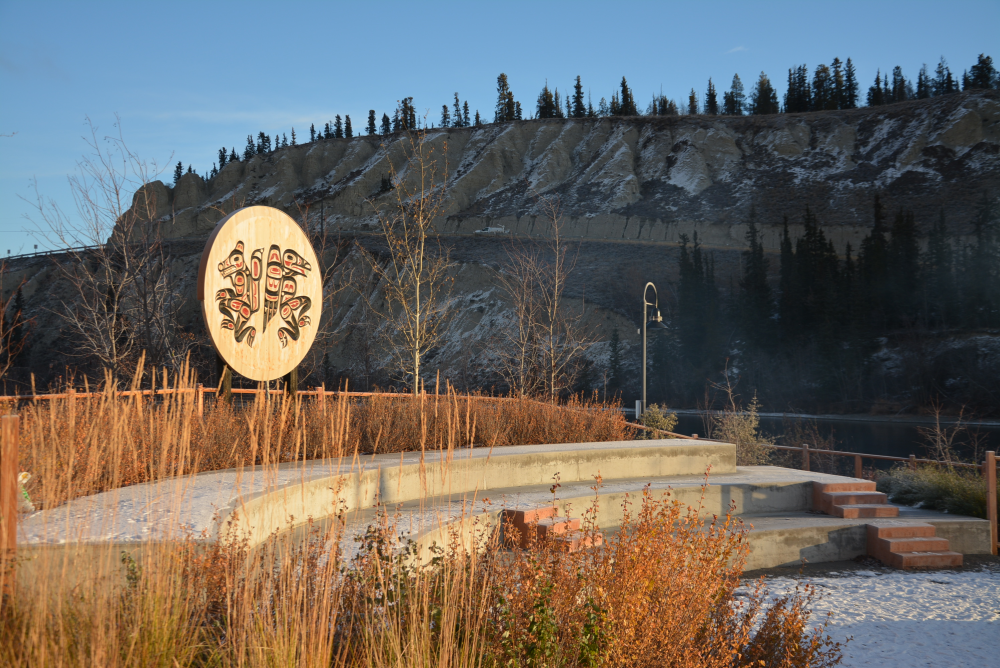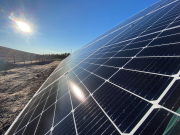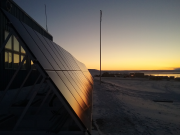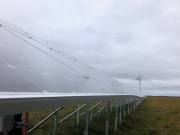Towards the end of October, over 220 Indigenous leaders, industry, utilities, academia, environmental non-profit organizations, and representatives from federal, provincial and territorial governments gathered for the 2017 Renewables in Remote Communities (RiRC 2017) conference. It was held in Whitehorse, Yukon on the traditional territory of the Kwanlin Dün First Nation and the Ta’an Kwäch’än Council, and co-hosted by the Pembina Institute and the Government of Yukon.
 The conference was the third of a series of successful biennial events aiming to learn, share, and innovate on the opportunities and challenges facing renewable energy development in remote Indigenous communities across Canada.
The conference was the third of a series of successful biennial events aiming to learn, share, and innovate on the opportunities and challenges facing renewable energy development in remote Indigenous communities across Canada.
This is a particularly exciting time for renewable energy development with heightened commitments recently made through the Pan-Canadian Framework on Clean Growth and Climate Change (PCF) and Budget 2017 to reduce diesel use and strengthen energy security in Canada’s north. By convening Indigenous leaders, northern stakeholders and experts, a major goal of RiRC 2017 was to catalyze the conversations and relationships necessary to ensure this additional funding is spent responsibly and with maximum impact.
Conference learnings
The conference officially commenced with the lighting of a sacred fire, which helped to ground participants in Indigenous culture and worldviews throughout the conference. A full day was dedicated to each of the conference’s key topics: human capacity and financial capacity.
 Attendees heard from the federal and territorial governments about their efforts to reduce reliance on diesel in remote communities. Perspectives were also provided by utilities, industry and leading experts on issues ranging from theories of human capacity to how to attract private equity by reducing project risk. Most importantly, Indigenous leaders shared their personal stories of how renewable energy projects have strengthened their communities, and the challenges they overcame along the way. These stories were honest, heartfelt, and resonated strongly with attendees who valued the opportunity to hear directly from community members championing their own energy transition.
Attendees heard from the federal and territorial governments about their efforts to reduce reliance on diesel in remote communities. Perspectives were also provided by utilities, industry and leading experts on issues ranging from theories of human capacity to how to attract private equity by reducing project risk. Most importantly, Indigenous leaders shared their personal stories of how renewable energy projects have strengthened their communities, and the challenges they overcame along the way. These stories were honest, heartfelt, and resonated strongly with attendees who valued the opportunity to hear directly from community members championing their own energy transition.
At the end of the second day, various Indigenous leaders from across Canada were invited onstage to share their experiences from the conference and where they are taking their work next. The conference was then officially closed by extinguishing the sacred fire and reflecting on how the information shared, the relationships built, and the next steps identified fit into the bigger picture of responsible stewardship of the land and the relationships we hold with each other.
Consensus amongst the participants was that human capacity must come first. Empowering people with the skills, training, mentorship and networks necessary to champion projects is the foundation of any successful endeavour. Leadership must come from within the community and not be subject to outside motives and proposals. Once the human capacity is in place, financial capital can then help propel the project forward.

We also heard from participants that they valued the authentic recognition of the challenges Indigenous people have faced throughout Canada’s history and continue to confront today, and the importance of empowering Indigenous communities. Starting with the lighting of the sacred fire, RiRC 2017 achieved a shift away from the standard “one-way download” of western perspectives and towards a more inclusive journey and exploration of Indigenous values, culture, knowledge and leadership. With generous travel support from Indigenous and Northern Affairs Canada, 30 Indigenous leaders from across the country were present to share their perspectives and views.
Renewable energy as part of reconciliation and decolonization
While the focus of RiRC 2017 was on renewable energy development in remote Indigenous communities, it is clear that access to clean energy is only one of many challenges facing Indigenous communities in Canada.
Indigenous leaders spoke to high suicide rates in their communities and the ongoing impacts and trauma from the residential school system. One of the Indigenous performers dedicated a song to her mother, who has been missing for many years. Organizations working to encourage renewable energy projects in Indigenous communities need to recognize the realities facing Indigenous communities, and ensure projects are consistent with the overarching objectives of reconciliation and decolonization.

There are many views and definitions of reconciliation, decolonization, and related terms that are becoming more mainstream in conversations and media coverage across Canada, and that are being increasingly explored, challenged and strengthened. Reconciliation involves acknowledging the discriminatory, colonial settler history of Canada and working to build stronger, more positive relationships between Indigenous and non-Indigenous Canadians. Decolonization (as recently discussed in a blog by Derek Kornelsen – an Assistant Professor at the University of Manitoba and a Principle Investigator with the SHARED Future project) is about acknowledging the western institutional systems that were imposed on Indigenous people, and empowering Indigenous people to regain control of the institutions and decision-making processes that control their everyday lives. The 26 comprehensive land claim agreements and 22 self-government agreements that have been signed since 1973 are an integral part of reconciliation and decolonization and work in this area is ongoing.
More Canadians are beginning to recognize the need for reconciliation and decolonization, encouraged by national and international developments like Canada’s Calls to Action of the Truth and Reconciliation Commission (TRC) and the United Nations Declaration on the Rights of Indigenous People (UNDRIP). The federal government has recently made encouraging steps, officially endorsing both the TRC Calls to Action and the UNDRIP, and initiating a review of federal laws, policies, and practices to identify and remedy those that are not consistent with these principles.
In our view, community-led renewable energy projects are one small but vitally important link to reconciliation and decolonization. Across Canada, more than 200,000 people in 280 northern and remote communities depend on diesel for electricity generation and heating. Burning diesel is associated with health risks, while transporting diesel increases the risk of fuel spills that damage valuable ecosystems.
Renewable energy projects championed by Indigenous communities can lessen these health and environmental issues, provide economic opportunities and harness energy in a way that is more compatible with traditional values of living in harmony with nature and acting as stewards of the land.
Indigenous leaders at RiRC 2017 spoke to many other benefits that Indigenous communities can derive from community-led renewable energy projects. Taking part in the hard work necessary to get a project off the ground builds valuable skills and capabilities. Seeing a successful project through to completion fosters a sense of pride and accomplishment by all involved. Collaboration between community members and with external government agencies and the private sector helps to build social capital and stronger, more positive relationships between Indigenous and non-Indigenous Canadians. Regaining control over how energy is generated and used within Indigenous communities is a step toward self-determination.
However, there is much more to understand about the relationship between renewable energy development, reconciliation and Indigenous health, which is the purpose of five-year SHARED Future research project funded through the Canadian Institute for Health Research. The Pembina Institute is proud to be a partner in the nation-wide team of Indigenous Elders, leaders, professors, academic researchers and other ENGOs convened by the project.
Looking forward
Moving forward, we will continue to play our part in advancing renewable energy projects in remote Indigenous communities. While we recognize that renewable energy is not a magic solution to the hardships faced by Canada’s Indigenous communities, we believe that community-led renewable energy projects are an important step in the longer journey that ends with meaningful reconciliation and decolonization, and that renewable energy is an area where the Pembina Institute can apply our knowledge and expertise related to broader energy and climate issues.
 We will continue to convene thought leaders, build relationships between Indigenous and non-Indigenous Canadians, and collaborate with partners across the country to further this meaningful work. We will watch and hold governments accountable on commitments to reconciliation and to ensure funding made available through the PCF and Budget 2017 supports feasibility studies and project costs, along with the development of human capacity in Indigenous communities. We will also remain engaged in the challenging, yet enriching conversations and initiatives tackled through the SHARED Future project.
We will continue to convene thought leaders, build relationships between Indigenous and non-Indigenous Canadians, and collaborate with partners across the country to further this meaningful work. We will watch and hold governments accountable on commitments to reconciliation and to ensure funding made available through the PCF and Budget 2017 supports feasibility studies and project costs, along with the development of human capacity in Indigenous communities. We will also remain engaged in the challenging, yet enriching conversations and initiatives tackled through the SHARED Future project.
Aletta Leitch was a Pembina Institute analyst based in Whitehorse, supporting the clean energy economy program.








